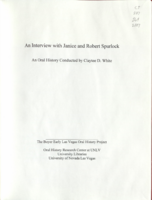Search the Special Collections and Archives Portal
Search Results

Transcript of interview with Earl A. Evans by Lance Malone, March 15, 1981
Date
Archival Collection
Description
On March 15, 1981 Lance Malone interviewed Sears Roebuck Division Manager, Earl A. Evans, Jr., (born March 3rd, 1935 in Alhambra, California) in Las Vegas, Nevada. This interview covers the history of Nevada and Mr. Evans’s life. During the interview, Mr. Evans discusses education, sports, employment, the weather and the railroad in Las Vegas. He also discusses transportation, recreation, community involvement, raising a family in Las Vegas, the development of Fremont and the Strip, and religious activities. Mr. Evans served as a Bishop for the LDS Church in Las Vegas and in regards to education, he served on the Clark County School Board.
Text

Transcript of interview with Janice and Robert Spurlock by Claytee White, June 17, 2010
Date
Archival Collection
Description
Janice and Robert Spurlock were married in 1990 and each has a lifetime of Las Vegas memories. They have made Sandy Valley home for nearly 32 years. Together the couple recalls the people and places of Las Vegas' past from their points of view during this oral history interview. For Janice the stories begin in the 1930s after her family moved to Las Vegas from California. She was a youngster of about five. Among the topics she talks about is walking to Fifth Street Grammar School, graduating from Vegas High School, and fun had during Helldorado Days. In 1953, Robert arrived. He was a young man headed from Arizona to Colorado seeking work as a welder. He stopped in Henderson, Nevada and never quite made it out of the area. For the next two decades he worked construction and helped build many local landmarks. He shares stories about the range wars and about being accidentally exposed to radiation from the Nevada Test site.
Text

Gene Leavitt interview, February 28, 1979: transcript
Date
Archival Collection
Description
On February 28, 1979, collector Monte Leavitt interviewed Gene Leavitt (born October 6th, 1923 in Mesquite, Nevada) at his home in North Las Vegas, Nevada. In this interview, Mr. Leavitt talks about his career as a truck and bus driver. He also talks about the life in Southern Nevada, the soldiers stationed here, and gambling.
Text

Transcript of interview with Evelyn Miller McDonald by Maylene C. Cabatingan, February 26 & 27, 1980
Date
Archival Collection
Description
On February 26, and 27, 1980, Maylene C. Cabatingan interviewed Evelyn Miller McDonald (born 1905 in Alderson, West Virginia) about her life in Las Vegas, Nevada. Also present during the interview is Maylene’s step-father (name unknown) who occasionally participates in the conversation. At the time of the interview, McDonald had lived in Nevada for over seventy-two years and described early Las Vegas as a small-town railroad community with few amenities. McDonald discusses her occupational history, and how her father started the first car garage in Las Vegas. She goes on to talk about the impact of the Great Depression on Las Vegas and how Hoover Dam’s construction reduced the severity of the financial depression in comparison to other cities. She then recites the hotels that were built and the appeal that Vegas had to tourists and divorcees. McDonald later discusses how prostitution was accepted by the community, and recalls a story about how local businessmen rallied together to ensure that a minister would preach the funeral for a young woman who had died, despite being a prostitute. McDonald concludes her interview with a brief discussion of her goals in life and her pride in her daughters.
Text

Interview with Donald R. Owen, June 23, 2004
Date
Archival Collection
Description
Text

Interview with Joyce Anne (Reese) Parkhurst, November 27, 2004
Date
Archival Collection
Description
Text

Interview with Robert Joseph Curran, July 18, 2005
Date
Archival Collection
Description
Text

Interview with James Donald Merlino, November 7, 2004
Date
Archival Collection
Description
Text

Interview with Jeannette (Jean) M. (Mactaggart) Crooks, July 21, 2004
Date
Archival Collection
Description
Text

Interview with Gary Hallmark, June 24, 2005
Date
Archival Collection
Description
Text
